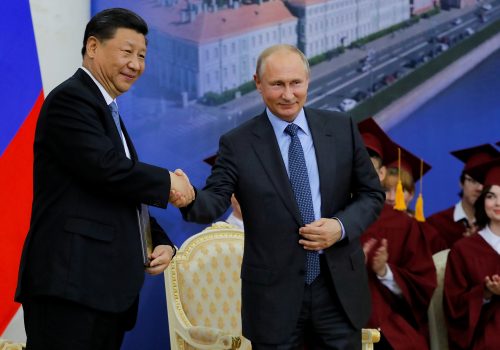Experts react: The US just accused Russia of meddling in the 2024 election. Here’s what to know.
It’s campaign season—and that includes malign influence campaigns. On Wednesday, the Biden administration announced new sanctions, criminal charges, and the seizure of more than thirty internet domains in response to what it alleges is an expansive malign influence operation by Russia targeting the 2024 US presidential election. According to US officials, the Kremlin used state-run media outlets, such as RT, as well as front organizations to spread false information and pro-Russian propaganda across social media. Today’s announcements follow reports of Russian interference in previous US elections that cast a long shadow over US politics.
Below, Atlantic Council experts shed light on what today’s announcements mean and what to expect next.
Click to jump to an expert analysis:
John E. Herbst: The US has made it harder for Russia to have an impact this November
Suriya Jayanti: A valuable reminder that Russia is an enemy state
This multifaceted effort shows exposure is not enough to fight malign election influence
The US government once again confirmed today that foreign malign influence efforts—which include major efforts by Russia and Iran—are real, ongoing, and actively targeting the foundations of American democracy. The announcement sheds light on evolving foreign threats to US elections, as well as a more comprehensive response by the US government.
Per the Department of Justice indictment, Russia’s influence efforts have clear goals to favor one US political campaign, diminish public confidence in the other, and undermine US support to Ukraine. The evidence provided cited original research from the Digital Forensic Research Lab (DFRLab) on Russia’s doppelgänger network and other covert efforts to deceive the American public. While some of Russia’s efforts achieved impressive social media statistics and millions of views, there is little evidence to suggest Russia succeeded in directly changing many hearts or minds.
The US government response included thorough indictments using varied legal tools from the Department of Justice, sanctions from the Treasury Department, and rewards for further exposure of malign influence efforts from the Department of State. This was a multifaceted approach that shows exposure is not enough. An array of actions is needed to stay above the partisan fray and effectively respond to malign influence as a national security threat. Today’s announcements, along with the regular public briefings by the US intelligence community about ongoing malign influence efforts ahead of the election, show that the United States is on alert and building resilience.
—Graham Brookie is the Atlantic Council’s vice president for technology programs and strategy, as well as the senior director of the DFRLab.
The US has made it harder for Russia to have an impact this November
There are times when the US government is able to marshal its formidable resources and, in a comprehensive and effective manner, address a serious challenge. Today, the Biden administration provided a welcome example of that as the Justice, Treasury, and State departments, working also with the Federal Bureau of Investigation (FBI), took decisive steps to disrupt a major Russian disinformation campaign to influence upcoming US elections. The Department of Justice indicted “two employees of RT, a Russian state-controlled media outlet, in a $10 million scheme to create and distribute content to U.S. audiences with hidden Russian government messaging.” The Treasury Department’s Office of Foreign Assets Control designated ten individuals and two entities for their role in this Kremlin effort to target US elections. The State Department is taking measures to ensure that the named individuals either never receive a US visa or have their visas revoked. And all of this was enabled by the investigations of the FBI.
This news did not come out of the blue. After all, Director of National Intelligence Avril Haines testified in Congress in May that Moscow was leading the pack among foreign governments in seeking to alter the course of this year’s presidential election. Nonetheless, this was a bold move designed to throw the Kremlin off balance. And it succeeded, including the leak of a message from senior Kremlin official Sergey Kiriyenko outlining the goal of influencing the election. All of this is reminiscent of the administration’s deft intelligence dump in the fall of 2021 that correctly depicted what Moscow would do when it launched its large invasion of Ukraine months later. The administration’s move will make it harder for Moscow to have an impact this November. But the Kremlin will keep trying.
—John E. Herbst is the senior director of the Atlantic Council’s Eurasia Center and a former US ambassador to Ukraine.
Russia’s actions underscore the need for more transparency and oversight for social media platforms
This is not the first time Russian-backed groups have tried to undermine democracies with covert influence campaigns. What we have seen across Europe, at least over the last two years, is an increasingly sophisticated effort by groups with direct ties to the Kremlin. That strategy has included the creation of fake websites, which pretended to be mainstream media outlets but were, in fact, used to spread Russian propaganda and disinformation directly to local social media users.
The main goal of all these Russian-backed influence campaigns is to promote Moscow’s worldview, which attacks Ukraine, seeks to undermine countries’ democratic institutions, and portrays the West as the main instigator of global harm. Given ongoing efforts by Washington and its allies to debunk such claims, Moscow has been forced to use increasingly complex covert efforts—spread from, in this case, Tennessee in the United States to Chișinău in Moldova to Caracas in Venezuela.
What the Department of Justice announced also highlights the ongoing need for greater transparency and outside oversight over what happens on social media. This clandestine Russian operation was able to post nearly two thousand videos, which garnered more than sixteen million views, collectively, on YouTube, according to the US government. The campaign was also active on TikTok, Instagram, and X. It’s a clear sign more needs to be done to give outside groups greater powers to track such covert state-backed influence operations, which, in this case, racked up such a large viewership.
—Mark Scott is a senior resident fellow with the DFRLab’s Democracy + Tech Initiative and a former chief technology correspondent for Politico.
A valuable reminder that Russia is an enemy state
The 2024 elections were always going to be a lure for foreign meddling, so of course Russia has been busy at it. But so have Iran and China. (Even purportedly friendly countries like Israel have mounted political influence campaigns.) The White House decision to spotlight Russia two months before the presidential poll may be something of a dog whistle given the widespread but ultimately unproven belief that Russian interference helped tip the 2016 election to Donald Trump. Unfortunately, with rampant—but entirely unjustified—allegations of election “stealing” already swirling on the MAGA right, any added election integrity concerns are likely to add fuel to an already blazing fire. But the Biden administration’s allegations are almost certainly true, and they are in line with Kremlin efforts worldwide to spread narratives in support of its illegal war in Ukraine. Today’s actions are good news for the continued prospects of US aid for Ukraine, as they remind the American public once again that Russia is an enemy state.
—Suriya Evans-Prichard Jayanti is a nonresident senior fellow at the Atlantic Council’s Eurasia Center and a former cybersecurity chief at the US embassy in Ukraine.
Further reading
Wed, Jul 3, 2024
Advancing freedom, defeating authoritarianism: A democracy agenda for 2025-2029
Report By Patrick Quirk
This report provides actionable and measurable policy recommendations for the upcoming administration's foreign policy to advance democracy and strengthen the US position in international development.
Wed, Aug 7, 2024
A Russia without Russians? Putin’s disastrous demographics
Russia Tomorrow By
A new Atlantic Council report explores the effect of Putin's politics on domestic Russian demographic change. Is Putin heading towards a Russia without Russians?
Thu, Feb 29, 2024
Undermining Ukraine: How Russia widened its global information war in 2023
Report By
On the battlefield, Russia has made strategic gains. In the information sphere, it has the resources and will to outlast the West.
Image: US Attorney General Merrick Garland gives remarks during a meeting of the Department of Justice’s Election Threats Task Force at the Justice Department in Washington, U.S., September 4, 2024. REUTERS/Annabelle Gordon


